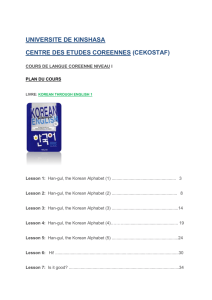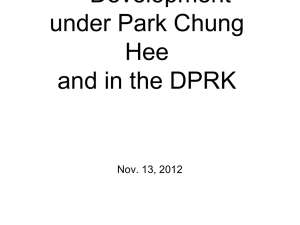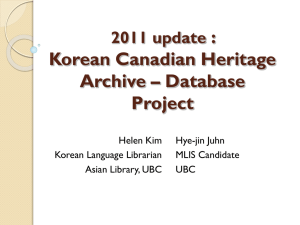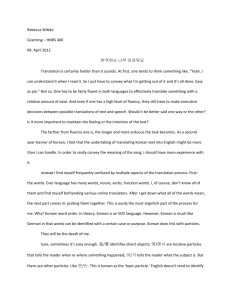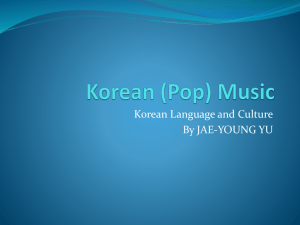Contemporary South Korean Cinema
advertisement
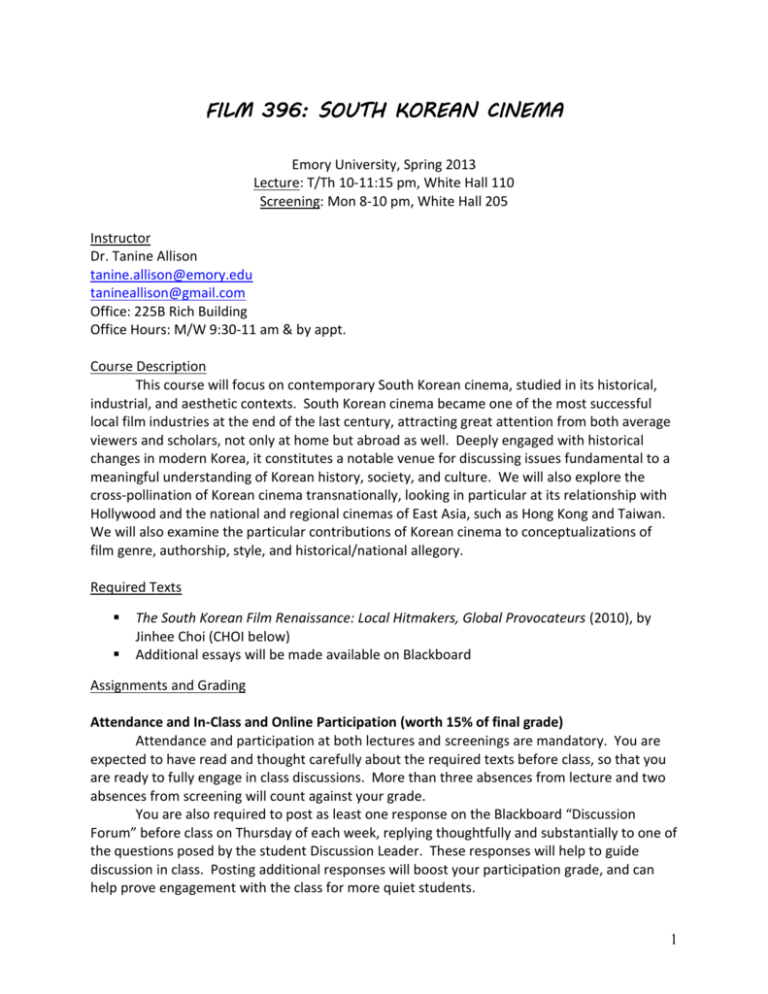
FILM 396: SOUTH KOREAN CINEMA Emory University, Spring 2013 Lecture: T/Th 10-11:15 pm, White Hall 110 Screening: Mon 8-10 pm, White Hall 205 Instructor Dr. Tanine Allison tanine.allison@emory.edu tanineallison@gmail.com Office: 225B Rich Building Office Hours: M/W 9:30-11 am & by appt. Course Description This course will focus on contemporary South Korean cinema, studied in its historical, industrial, and aesthetic contexts. South Korean cinema became one of the most successful local film industries at the end of the last century, attracting great attention from both average viewers and scholars, not only at home but abroad as well. Deeply engaged with historical changes in modern Korea, it constitutes a notable venue for discussing issues fundamental to a meaningful understanding of Korean history, society, and culture. We will also explore the cross-pollination of Korean cinema transnationally, looking in particular at its relationship with Hollywood and the national and regional cinemas of East Asia, such as Hong Kong and Taiwan. We will also examine the particular contributions of Korean cinema to conceptualizations of film genre, authorship, style, and historical/national allegory. Required Texts The South Korean Film Renaissance: Local Hitmakers, Global Provocateurs (2010), by Jinhee Choi (CHOI below) Additional essays will be made available on Blackboard Assignments and Grading Attendance and In-Class and Online Participation (worth 15% of final grade) Attendance and participation at both lectures and screenings are mandatory. You are expected to have read and thought carefully about the required texts before class, so that you are ready to fully engage in class discussions. More than three absences from lecture and two absences from screening will count against your grade. You are also required to post as least one response on the Blackboard “Discussion Forum” before class on Thursday of each week, replying thoughtfully and substantially to one of the questions posed by the student Discussion Leader. These responses will help to guide discussion in class. Posting additional responses will boost your participation grade, and can help prove engagement with the class for more quiet students. 1 Discussion Leader (worth 10% of final grade) You will work with a partner to research one of the films on our syllabus, present basic information about the film/filmmaker in a 5-10 minute presentation to the class on the Thursday before we view the film, post discussion questions to the Discussion Board on Blackboard by 9 am on the Tuesday after we view the film, and help lead the discussion in-class on Tuesday. 3 Take-Home Essay Tests (each worth 15% of final grade) There will be 3 take-home essay tests requiring application of concepts from the readings to the films from that unit. The questions will be distributed a week ahead of time with specific instructions. They should be turned in via email to the professor. Final Research Paper (worth 30% of final grade) You will research a particular film, filmmaker, genre, or topic in Korean cinema. Deadlines are provided for a proposal, annotated bibliography (worth 10% of final grade), rough draft (brought to class for peer review), and final draft (worth 20% of final grade). Plagiarism/Honor Code You are expected to follow the Emory College of Arts and Sciences Honor Code (http://college.emory.edu/home/academic/policy/honor_code.html). The honor code is in effect throughout this semester, and relates to all aspects of the work you do in this course. By taking this course, you affirm that it is a violation of the code to cheat on exams, to plagiarize, or to deviate from the teacher’s instructions about collaboration, on all work that is submitted for grades. You agree that the teacher is entitled to move you to another seat during examinations, without explanation. You also affirm that if you witness others violating the code you have a duty to report them to the honor council. All assignments turned in for this class must be the student’s own work or must be properly attributed to the original source with proper citations. Any cited work (including any text cited or consulted on the Internet) should be documented using MLA style or Chicago Manual of Style. Cheating on a test or turning in work that includes plagiarized material or was written by someone else will result in a report to the Honor Council, which can lead to failure for the course and other consequences. Please consult your instructor if you have any questions about what constitutes plagiarism or how to properly cite material. Course Schedule UNIT I: MEDIATIONS OF KOREAN CULTURE AND HISTORY Week 1 (1/14) Screening: None 2 Readings: Please read for Thursday, 1/17: CHOI “Introduction” and review the website, “A Short History of Korean Film,” by Darcy Paquet http://bit.ly/XzgVqF Week 2 (1/21) Struggles for Democracy Screening: Watch Chilsu and Mansu (Park Kwang-su, 1988) on your own—available on YouTube, http://bit.ly/W48QbF Readings: Lee, Namhee. The Making of Minjung: Democracy and the Politics of Representation in South Korea (Ithaca: Cornell UP, 2007): 1-69. Gateward, Frances. “Youth in Crisis: National and Cultural Identity in New South Korean Cinema,” in Jenny Kwok Wah Lau ed. Multiple Modernities: Cinemas and Popular Media in Transcultural East Asia (Philadelphia: Temple UP, 2003): 114-127. Week 3 (1/28) Traditional Korean Culture in Modernity Screening: Sopyonje (Im Kwon-taek, 1993) Readings: Kim, Kyung Hyun. “Korean Cinema and Im Kwon-taek: An Overview,” James, David E. and Kyung Hyun Kim ed. Im Kwon-Taek: The Making of a Korean National Cinema (Detroit: Wayne State UP, 2002): 19-46. Kim, Kyung Hyun. “Virtual Landscape: Sopyonje, The Power of Kangwon Province, and The Host,” Virtual Hallyu: Korean Cinema of the Global Era (Durham: Duke UP, 2011): 23-31. Cho, Hae Joang. “Sopyonje: Its Cultural and Historical Meaning,” James, David E. and Kyung Hyun Kim ed. Im Kwon-Taek: The Making of a Korean National Cinema (Detroit: Wayne State UP, 2002): 134-156. Week 4 (2/4) History and Failure Screening: Peppermint Candy (Lee Chang-dong, 1999) Readings: Choe, Steve. “Catastrophe and Finitude in Lee Chang-dong’s Peppermint Candy: Temporality, Narrative, and Korean History,” Post Script, 27.3 (Summer 2008): 132-144. Magnan-Park, Aaron Han Joon, “Peppermint Candy: The Will ‘Not’ to Forget,” in Chi-Yun Shin and Julian Stringer ed. New Korean Cinema (New York: New York UP, 2005): 159-69. **Take-home essay questions distributed UNIT II: “BLOCKBUSTER SYNDROME” AND THE KOREAN FILM RENAISSANCE Week 5 (2/11) Blockbusters of National Division I 3 Screening: Shiri (Kang Je-gyu, 1999) Reading: CHOI, Ch. 1 and Ch. 2 **Take-home essay test #1 due via email to professor by Friday 2/15 before midnight Week 6 (2/18) Blockbusters of National Division II Screening: Joint Security Area (Park Chan-wook, 2000) Readings: Kim, Suk-Young. “Crossing the Border to the ‘Other’ Side: Dynamics of Interaction between North and South Koreans in Spy Li Cheol-jin and Joint Security Area,” in Frances Gateward ed. Seoul Searching: Culture and Identity in Contemporary Korean Cinema (Albany: State University of New York P, 2007): 219-42. Gombeaud, Adrien. “Joint Security Area,” in Justine Bowyer ed. The Cinema of Japan and Korea (London: Wallflower Press, 2004): 235-40. Week 7 (2/25) Bong Joon-ho Case Study I: The Police Procedural Screening: Memories of Murder (Bong Joon-ho, 2003) Readings: CHOI, Ch. 6 Moon, Jae-cheol. “The Meaning of Newness in Korean Cinema: Korean New Wave and After,” Korea Journal (Spring 2006): 36-59. Rayns, Tony. “Suspicious Mind,” Sight & Sound, 161 (Sept. 2004): 18-20. Week 8 (3/4) Bong Joon-ho Case Study II: The Monster Movie Screening: The Host (Bong Joon-ho, 2006) Reading: Klein, Christina. “Why American Studies Needs to Think about Korean Cinema, or, Transnational Genres in the Films of Bong Joon-ho,” American Quarterly 60: 4 (December 2008): 871-898. ** Take-home essay questions distributed; FINAL PAPER PROPOSAL DUE via email to the professor by Friday 3/8 before midnight >>>> SPRING BREAK 3/11-3/15 <<<< UNIT III: POPULAR GENRES AND ART-HOUSE FAVORITES Week 9 (3/18) The Romantic Comedy 4 Screening: My Sassy Girl (Kwak Jae-yong, 2001) Reading: CHOI, Ch. 4 **Take-home essay test #2 due via email to professor by Friday 3/22 before midnight Week 10 (3/25) Action Art-House from the “Tarantino of the East” Screening: Old Boy (Park Chan-wook, 2003) Readings: Kim, Kyung Hyun. “‘Tell the Kitchen That There’s Too Much Buchu in the Dumpling’: Reading Park Chan-wook’s ‘Unknowable’ Old Boy,” Korea Journal (Spring 2006): 84-107. Tomkins, Joseph and Julie A. Wilson. “The Political Unconscious of Park Chan-wook: The Logic of Revenge and the Structure of Global Capitalism,” Post Script 27.3 (Summer 2008): 69-81. Week 11 (4/1) Kim Ki-duk: From Asian Extreme to Transcendence Screening: Spring, Summer, Fall, Winter… and Spring (Kim Ki-duk, 2003) Reading: CHOI, Ch. 7 (to page 182) **ANNOTATED BIBLIOGRAPHY DUE via email to the professor by Friday, 4/5 before midnight Week 12 (4/8) The “Kimchi Western” Screening: The Good, the Bad, the Weird (Kim, Ji-woon, 2008) Readings: Warshow, Robert, “Movie Chronicle: The Westerner,” in The Immediate Experience: Movies, Comics, Theatre and Other Aspects of Popular Culture (Cambridge: Harvard UP, 2001): 105-124. Kim, Soyoung, “Genre as Contact Zone,” in Meaghan Morris, Siu Leung Li and Stephen Chan Ching-kui, eds. Hong Kong Connections: Transnational Imagination in Action Cinema (Durham: Duke UP, 2006): 97-110. Chung, Hye Seung, “The Man with No Home/Musukja (1968): Shane Comes Back in a Korean ‘Manchurian Western,’” Journal of Popular Film and Television, 39.2 (2011): 71-83. **Take-home essay questions distributed Week 13 (4/15) The Gangster Film Screening: Attack the Gas Station (Kim Sang-jin, 1999) 5 Reading: CHOI, Ch. 3 Abelmann, Nancy and Jung-ah Choi. “‘Just Because’: Comedy, Melodrama and Youth Violence in Attack the Gas Station,” in Chi-Yun Shin and Julian Stringer ed. New Korean Cinema (New York: New York UP, 2005): 132-43. ** Take-home essay test #3 due via email to professor by Friday 4/19 before midnight Week 14 (4/22) Film Festival Favorite Screening: Secret Sunshine (Lee Chang-dong, 2010) Reading: Kim, Kyung Hyun, “Virtual Trauma: Lee Chang-dong’s Oasis and Secret Sunshine,” in Virtual Hallyu: Korean Cinema of the Global Era (Durham: Duke UP, 2011): 151-177. **BRING ROUGH DRAFT OF FINAL PAPER TO CLASS on Thursday, 4/25 Note: there will be no screening on the last day of Emory classes, Monday 4/29 **FINAL PAPER WILL BE DUE ON OUR “FINAL EXAM” DATE TBA 6
